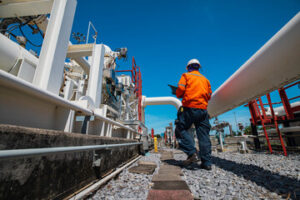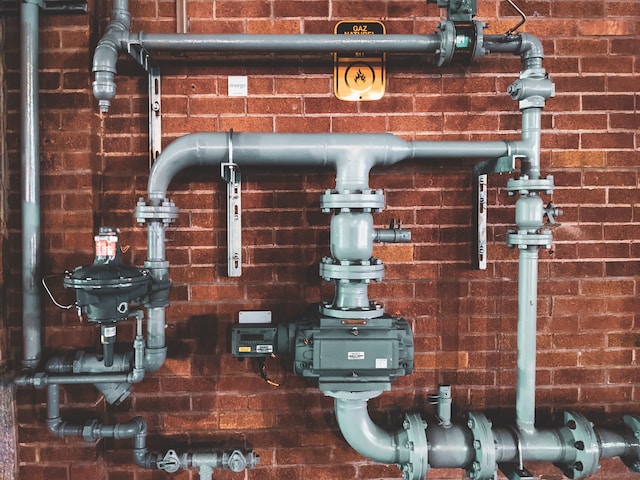Pursuant to Local Law 152 of 2016, every four years on a set schedule, all buildings that have gas piping must be inspected by a qualified person. These inspections are conducted by Licensed Master Plumbers or persons working under their direct and continuing supervision.

Buildings that do not have gas piping systems must submit a Certification (from a registered design professional*) declaring that they contain no such system. This is submitted through the DOB GPS2 submission portal. Contact NYC Gas Piping Inspection for more information.
As a property owner or manager, you likely have a gas line running through your building. That line needs to be inspected on a regular basis in order to prevent leaks, which can cause fires and explosions. The Department of Buildings (DOB) requires certain properties to undergo inspection on a set schedule. Local Law 152 of 2016 requires inspections for buildings with gas piping systems. This requirement is to ensure the safety of building occupants, neighbors, maintenance staff, and city first responders.
The rule applies to all buildings except one and two-family homes and those classified as Occupancy Group R-3. That amounts to about 280,000 buildings throughout the city. The rule states that the gas piping system must be inspected by a Licensed Master Plumber (LMP) or an individual working under an LMP.
During the inspection, the engineer will check for the following conditions. If any of these are present, the building owner must take action:
After the LMP completes an inspection, he or she will submit to DOB a Gas Piping System Periodic Inspection Certification (GPS2) through DOB’s online portal. This report must be signed and sealed by the LMP who conducted or supervised the inspection. Within 60 days after the inspection, the owner must also submit to DOB a list of conditions that require correction.
If any conditions identified in the GPS1 need to be corrected, the building owner must correct them in compliance with Construction Codes and obtain any required work permits. The LMP must notify the owner, the utility that provides gas service to the building, and DOB of any unsafe or hazardous conditions observed during the inspection.
If the inspector determines that the gas piping is in good condition, the building owner must submit to DOB a statement confirming that no work was performed on the gas piping system during the inspection. DOB will then send a notice of approved inspection to the owner and the utility. The building owner must retain a copy of the approved inspection record for 10 years.
The Engineer Checks Your Pipe
During your inspection, the engineer will examine the piping to look for any signs of corrosion, pitting, leaking joints, loose or disconnected piping and any other potential issues. These items can be very dangerous, and should always be addressed immediately. If the inspector finds any problems, they will write up a report with suggestions for repairs or corrections.
Once the inspector completes their work, they will send you a copy of the GPS1 report via email or fax. You will then have 60 days to file your GPS2 report online through the Department of Buildings’ online certification submission portal. Failure to submit your report by the deadline may result in a fine of up to $10,000.
A building owner who is unable to comply with the reporting deadlines can request a 180-day extension by using DOB’s online portal. Once the extension period expires, you will need to submit another GPS2 report to DOB and have your piping inspected again.
In order to perform a LL152 inspection, your inspector must be a licensed master plumber (LMP). You can find a list of LMPs on DOB’s website, or you can use the Master Plumbers Council’s Know Your Construction Professional tool. You can also check for disciplinary action and voluntary surrender records on DOB’s website.
If you are unsure whether your property needs an inspection, or you have questions about how to proceed, feel free to give us a call.
The Engineer Checks Your Appliances
If you’re a landlord, it’s important to make sure your gas appliances and pipework are up to scratch. During a gas safety check, a Gas Safe registered engineer can spot issues that could be dangerous or unsafe for your tenants. This includes carbon monoxide poisoning (CO), which can occur when a gas appliance doesn’t burn properly, or when flues, vents and chimneys become blocked.
CO is a deadly gas that can’t be seen, tasted or smelled, but it can cause headaches, dizziness and nausea in some people. It can also lead to unconsciousness and even death, and the best way to protect yourself is to have your appliances checked regularly by a qualified Gas Safe registered engineer.
A faulty appliance or damaged pipework can produce dangerous levels of CO, so it’s vital that you have them professionally inspected and serviced by a registered engineer every year. This will help to reduce the risk of an explosion or fire in your property, and it’s a requirement by law for landlords who let properties with gas appliances.
During an LL152 inspection, the engineer will check all of your gas appliances and the associated pipework to make sure they’re in good condition. They’ll also inspect your gas meter and the location of any gas barrels, and ensure there’s proper ventilation in the area where you keep your gas equipment.
The next step is that the engineer will look for any obvious damage or signs of a leak to your gas pipework, and they’ll use a pressure test to check that all of your pipes are tight. Ideally, they’ll also look for any loose connections on your appliances and check whether any are fitted incorrectly or have been damaged.
Once the inspector has completed the inspection, they’ll send a GPS1 Gas Piping Periodic Inspection Report to you. It’s your responsibility to file the report with the city Department of Buildings, and you can do so online for free. This process is designed to prevent accidents or other problems that could result from a faulty gas system, and it can help protect you from hefty fines.
The Engineer Checks Your Meter
Whether your building is required to have its gas line inspected under Local Law 152 or for another reason, you can’t afford to take chances. Problems with gas piping can lead to poor air quality, fires, or even explosions. That’s why the city requires that all buildings have their gas lines inspected by qualified professionals.
Gas piping inspections are required by the city every four years on a set schedule. This ensures that the piping is safe for building occupants, neighborhood residents, and city first responders. If a condition is found that could be hazardous, the inspector must notify the owner, utility company, and the DOB.
The inspection process typically begins with the examiner removing your meter and taking it away for testing. Once the meter is returned, you will be given a determination, which tells you whether your meter is working within legal limits or not. If the meter is not working correctly, it will need to be replaced by the energy supplier.
If your meter is not displaying the correct values on its screen, it is likely due to a wiring error. This could be caused by a lack of proper commissioning testing, a misprogrammed VOLTS MODE setting, or the incorrect PT and CT ratios. Incorrect wiring may also produce erroneous W, VA, and VAr values. In most cases, these errors are caused by incorrect polarity on the meter’s load connections.
To make sure your meter is properly wired, you should check the meter installation specifications for details on where to connect the load current probes and the reference voltage terminal block. You should also physically verify the meter’s CT size markings and document the CT ratio. Finally, you should make sure the meter circuit is protected by a fuse or circuit breaker suitable for the maximum meter circuit current.
Once the LMP has completed the inspection, he or she must provide the owner with a Gas Piping System Periodic Inspection Report. If the inspection reveals conditions that need to be corrected, the LMP must submit to the DOB a GPS2 Certification signed and sealed by the LMP who conducted or supervised the inspection (or a qualified individual working under the supervision of an LMP). In addition, the GPS2 must be submitted through DOB’s online portal.
